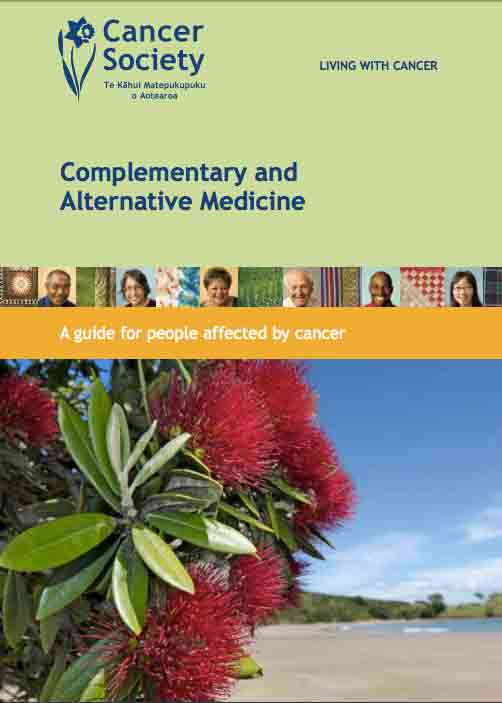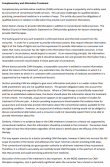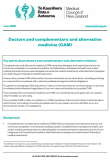If you're a frequent visitor to Healthify, why not share our site with a friend? Don't forget you can also browse Healthify without using your phone data.
Complementary and alternative medicine
Also called complementary and alternative therapy, natural medicine, herbal remedies, non-conventional medicine and holistic medicine
Key points about complementary and alternative medicine (CAM)
- The term complementary and alternative medicine (CAM) is usually used to describe a medical product or practice that's outside what is considered mainstream, conventional or traditional medical care.
- When complementary medicine or practices are used together with conventional medicine, it's considered ‘complementary’.
- When complementary medicine or practices are used instead of conventional medicine, it's considered ‘alternative’.

The term complementary and alternative medicine (CAM) is usually used to describe a medical product or practice that's outside what is considered mainstream, conventional or traditional medical care.
When complementary medicine or practices are used together with conventional medicine, it's considered ‘complementary’. For example, using acupuncture to help with side effects of cancer treatment.
When complementary medicine or practices are used instead of conventional medicine, it's considered ‘alternative’. For example, using diet and herbal remedies for a condition instead of using recognised treatments for the condition.
CAM is also sometimes called:
- complementary and alternative therapy
- natural medicine
- herbal remedies
- non-conventional medicine
- holistic medicine.
Many different practices come under the term complementary and alternative medicine (CAM). The following are some examples:
Acupuncture
Acupuncture is when fine, solid needles are put into any part of your body. Acupuncture may be referred to as traditional Chinese acupuncture, Western or medical acupuncture or dry needling. Read more about acupuncture.
Aromatherapy
Aromatherapy is the use of essential oils through inhalation and vaporisation, or by use in a bath or shower, massage, spritzer sprays, skin care or compresses. Care needs to be taken when using any essential oils, particularly for babies, children, older adults or during pregnancy. Read more about aromatherapy.
Ayurveda or Ayurvedic medicine
Ayurveda is a traditional Indian system of healing. It can include dietary changes, supplements, yoga, meditation and massage.
Some Ayurvedic products can contain unknown or unverified ingredients. There is a wide variation between products. Particular caution is urged when these products come with no packaging, labelling, or are from uncertain sources.
If you become unwell after taking an Ayurvedic medicine, seek urgent advice from your doctor or pharmacist. Help is also available by calling Healthline on 0800 611 116.
Traditional Chinese medicine (TCM)
TCM includes many different treatments, eg, Chinese herbal medicine, moxibustion, cupping, tuina and tai chi. Acupuncture and Chinese herbal medicine are the most well known form of CAM in many Western countries.
Chiropractic therapy
Chiropractic therapy is based on moving parts of your spine to ease pain and help you feel better. Read more about chiropractic therapy.
Herbal products and dietary supplements
These products are found in nature, eg, the plant St John's Wort. Although they occur in nature, some of the chemicals within them can cause side effects or interact with conventional medicines. Read more about supplements.
Homeopathy
Homeopathy uses highly diluted substances based on the belief that ‘like cures like’. Practitioners claim homeopathic remedies can help your body to heal itself.
Massage
Massage is used to help circulation (blood flow), ease tension (loosen tight muscles) and lower stress. Read more about massage.
Osteopathy
Osteopathy involves an osteopath gently moving your joints and muscles to ease pain and help you feel better.
Rongoā Māori (traditional Māori healing)
Rongoā Māori is an important part of healthcare for many Māori and is based on a holistic approach to health. It includes native plant-based remedies, physical therapies and spiritual healing. Read more about Rongoā Māori.
Many alternative treatments seem to work, but whether this is due to an actual clinical effect or belief that it will work (called the placebo effect – see below), is undecided. It's difficult to use scientific methods to check whether CAM has made a difference – only a few high quality studies of alternative therapies exist.
The placebo effect
The placebo effect is a phenomenon in which a placebo (a fake treatment that contains no active ingredients) leads to improvement in a person's condition simply because the person expects that it will be helpful.
In a similar way, when the belief in the value of an alternative therapy is strong, this can account for the success of a treatment even if scientifically it may not be accepted.
Other factors may lead to the success of CAMs
- People may get better due to the natural course of an illness and think this could be due to their alternative therapy.
- Many illnesses are cyclical and people often seek alternative therapy when symptoms are at their worst. When symptoms improve, this is attributed to the therapy.
- An alternative therapy may be tried after conventional medical treatment and, when symptoms improve, it's attributed to the new therapy rather than the medical treatment.
- If the original diagnosis is wrong, then claims of a cure are meaningless.
- The time and attention from the provider of alternative therapy may improve well-being.
- Alternative therapies may help to give hope.
Questions to ask
Before using CAM, talk with your doctor and other healthcare providers about it. Together you can discuss any benefits of using CAM,check interactions with your conventional medicine or treatment and any safety concerns. For example, some plants can interact with conventional medicines.
The sorts of questions that you and your healthcare provider may want to discuss include the following:
- Is there clinical evidence of effect?
- Is it safe? You can check for warnings on natural and herbal products on the Medsafe(external link) website.
- Is it expensive? In Aotearoa New Zealand, the Accident and Compensation Corporation (ACC) funds acupuncture, chiropractic manipulation and osteopathy.
- Are there adverse effects?
- Does it interact with other medications?
- Will it compromise conventional medical treatment – make it work less effectively?
- Will it reduce the need for conventional medications?
As with any decision concerning your health, decisions about whether to use complementary approaches are important. The National Center for Complementary and Integrative Health (NCCIH), an American website, has developed information to help in the decision making about complementary health products and practices(external link).
Find out more information on the product or service
The following link provides further information on CAM products and services. Be aware that research from other countries may contain information that differs from New Zealand recommendations.
Cochrane is a global independent network of researchers, professionals, patients, carers, and people interested in health. Its contributors come from more than 130 countries and they work together to produce credible, accessible health information that is free from commercial sponsorship and other conflicts of interest. There are many Cochrane reviews on complementary and alternative products and therapies. Search the Cochrane database for evidence(external link) on CAM.
Lack of regulation
In Aotearoa New Zealand there is a Natural Health Products Advisory Group (external link)that advises the Ministry of Health on natural health products. Other than this, there is limited regulation of products or services through specific legislation or a single organisation that is responsible for ensuring the safety of all complementary or alternative medicine.
Herbal or natural products and dietary supplements may have safety concerns because of this lack of regulation for safety, effectiveness and quality. This is different to conventional medicines that undergo rigorous testing and must show safety and benefit before they are made available for public use.
In Aotearoa New Zealand, Medsafe(external link) reports adverse effects and interactions associated with herbal products and dietary supplements. It's not only the main ingredients that can be of concern, but other substances, eg, preservatives and other ingredients. These are known as excipients, read more about excipients in medicines(external link). An example from February 2024 is the cases of lead poisoning with Ayurvedic Medicines(external link).
Registered health professionals must meet professional standards under the Health Practitioners Competence Assurance Act 2003. They must maintain their professional competence and can’t practice outside their area of expertise.
While some practitioners of complementary and alternative medicine are registered health professionals, many are not registered. Those who are not registered are not subject to the Health Practitioners Competence Assurance Act 2003.
Resources
Complementary and alternative medicine(external link) Cancer Society, NZ
Complementary and alternative treatment(external link) Health and Disability Commissioner, NZ
References
- Complementary, traditional and alternative therapies(external link) Cancer Society, NZ, 2023
- Complementary and alternative medicine(external link) NHS, UK, 2022
- Recent cases of lead poisoning with Ayurvedic medicine(external link) Medsafe, NZ, 2024
- Doctors and complementary and alternative medicine(external link) Medical Council of New Zealand, 2022
- Solving New Zealand's complementary and alternative medicine product crisis: a risk-based proposal(external link) Canterbury Law Review, NZ, 2018
- Regulating medicines, medical devices and natural health products(external link) Ministry of Health, NZ, 2024
- Complementary and alternative treatment(external link) Health and Disability Commissioner, NZ, 2017
-
Ayurvedic medicines update(external link) Medsafe, NZ, 2025
Doctors and complementary and alternative medicine (CAM)(external link) Medical Council of NZ, 2022
Brochures

Cancer Society, NZ, 2014

Health and Disability Commissioner, NZ, 2017

Doctors and complementary and alternative medicine (CAM)
Medical Council of New Zealand, NZ, 2022
Credits: Healthify editorial team. Healthify is brought to you by Health Navigator Charitable Trust.
Reviewed by: Stephanie Yee, Pharmacist, Auckland
Last reviewed:
Page last updated:





